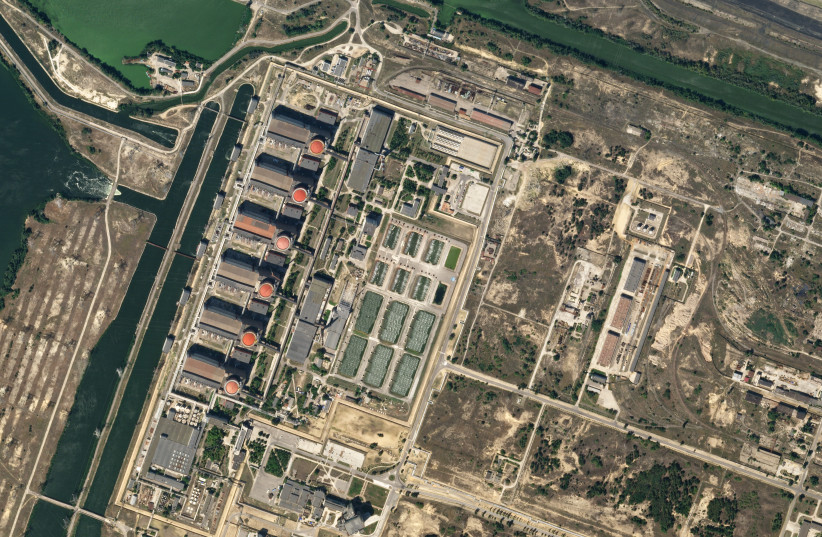Explosions rocked an ammunition depot and disrupted trains in Russian-annexed Crimea on Tuesday, the latest such incident in a region Moscow uses as a supply line for its war in Ukraine.
Moscow's senior representative in the region, Sergei Aksyonov, confirmed that two people were wounded, railway traffic halted and about 2,000 people evacuated from a village near the military depot - but he skirted talk of a cause.
Ukraine hinted at involvement which, if true, could show it has a new capability to strike deeper into Russian territory, potentially changing the dynamic of the six-month war.
The Crimean peninsula on the Black Sea, which Russia seized from Ukraine in 2014 in a move unrecognized by most countries, is the base of Russia's Black Sea Fleet and popular in the summer as a holiday resort.
Last week, blasts at a military air base on Crimea's western coast caused extensive damage and destroyed several Russian warplanes. Moscow called that an accident, though simultaneous blasts left craters visible from space.

In Tuesday's incident, an electricity substation also caught fire near the town of Dzhankoi, according to footage on Russian state TV. It showed large explosions on the horizon which authorities said came from the ammunition detonations.
Russia's RIA news agency said seven passenger trains had been delayed and that rail traffic on part of the line in northern Crimea had been suspended. That could disrupt its ability to support troops in Ukraine with military hardware.
Ukraine has not officially confirmed or denied responsibility for explosions in Crimea, though its officials have openly cheered incidents in territory that, until last week, appeared safe in Moscow's grip beyond the range of attack.
On Tuesday, Ukrainian presidential adviser Mykhailo Podolyak tweeted cryptically: "A reminder: Crimea (as a) normal country is about the Black Sea, mountains, recreation and tourism, but Crimea occupied by Russians is about warehouse explosions and high risk of death for invaders and thieves. Demilitarisation in action."
Kyiv aims to disrupt Russian supply lines ahead of a planned Ukrainian counter-attack.
Like the air base, the ammunition depot is out of range of the main rockets Western countries acknowledge giving Ukraine, raising the prospect that it has acquired new capability.
Nuclear blame game
With the war raging since Feb. 24, attention has also focused in recent days on shelling in the vicinity of the Zaporizhzhia nuclear plant in southern Ukraine. Both sides have blamed each other for risks to Europe's largest nuclear facility, which Russia has seized though Ukrainian technicians operate it.
Ukrainian President Volodymyr Zelensky has accused Russia of using the site as a shield for attacks and risking a nuclear catastrophe. He wants new sanctions on Moscow's nuclear sector.
Russian officials say it is their enemies who are shelling.
Reuters could not immediately verify battlefield reports.
The conflict has caused millions to flee, killed thousands, and deepened a geopolitical rift between Moscow and the West.
Russia calls its invasion a "special military operation" to demilitarise its neighbor, protect Russian-speaking communities and push back against the NATO military alliance's expansion.
Ukraine and Western backers accuse Russian President Vladimir Putin of waging an imperial-style war of conquest.
Putin accused the United States of trying to "drag out" conflict in Ukraine by supporting the Zelenskiy government. Washington also wanted to extend a "NATO-like system" into the Asia-Pacific region after "a thoroughly planned provocation" with US House of Representatives Speaker Nancy Pelosi's visit to Chinese-claimed Taiwan this month, Putin told a conference.
Even as the biggest attack on a European state since 1945 ground on, there was progress on a grain deal to ease a global food crisis created by the conflict.
The ship Brave Commander left the Ukrainian port of Pivdennyi, carrying the first cargo of humanitarian food aid bound for Africa from Ukraine since Russia's invasion.
Ukraine's grain exports have slumped because of the closure of its Black Sea ports, driving up global food prices and sparking fears of shortages in Africa and the Middle East.
On the battlefield, the sides reported no major changes to positions.
Ukraine reported continued Russian shelling and rocket attacks in the Donbas eastern area, and success in repelling attempted Russian advances near the Lysychansk oil refinery in the Luhansk region of the Donbas.
